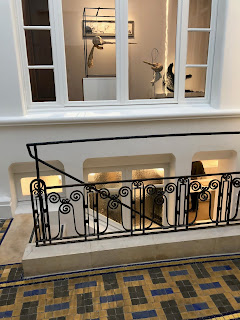Yesterday I was invited to be a dragon for the third time.
You know, the Dragon’s Pen thing where
unpublished writers do a pitch to a
panel for a specific – very specific – period of time and then the Dragon’s quiz them, comment, tell them what to steer clear of and
what was great about their pitch and its subject novel.
There were three
dragons; Me. Mr Douglas Skelton the
‘mastermind behind Carry On Sleuthing’ as he was described, author of the Davy
McColl series and the Dominic Quest series.
And an MIE guest blogger. The third Dragon was supposed to be Pat Young,
Author of Till the Dust Settles plus other books, also a MIE guest blogger. But
she was going to be involved at a later stage of pitching so couldn’t be in the room to hear it all this
time round. So was Michael Malone, he was banished to the coffee shop as he
might be hearing our ‘winner’ at the
Scottish Writers Association
annual extravaganza, and prior knowledge is not permitted.
The SAW are very organised. And very well behaved.
I am not a member. Did that surprise you?
The middle seat was then taken by a lovely lady called
Sheila Grant, a reviewer and article writer, mostly for Highland Magazine and
their ilk. Interesting to have a ‘professional
reader’ on the panel rather than
three writers. Would her opinion be very different to ours? And she knew the writers who were
speaking. Would she have her
favourites? Would she show any
favouritism? Were any of them really annoying? Would she tell us? ( She didn’t!)
And it was a dreadful night weatherwise. Ayr is right on the
coast, Burns Country, the wind was gale
force, so strong that the hotel had a pile of chairs against the front doors to
stop them blowing open and we had to go down a back alley to get in. The rain
was horizontal, then it bounced off the
pavement to have another go. I got totally soaked. It was bitter, bitter cold.
No change there then.
It wasn’t the first time I had dragoned, but it was interesting because in this one we
had to choose a ‘winner’. So we secretly marked each pitcher out of ten. And what
do you think happened? Considering the judges really came from different corners of the crime writing fraternity; an ex
journalist, a reader and a mad woman who had to sit through the whole thing
with wet pants!
The answer? An incredible
uniformity in our scoring. The winner
was the only one that scored straight 8’s across the board. And it wasn’t a
book that any of us would have read, not being in our particular interest but
there was a complete world forged, humour, adventure, touches of emotion
and a short conversation on the number
twelve bus going through Glasgow city entre ( just to ground the narrative a little)
It was followed by a question and answer session where I
exploded with multiple Glaswegian expletives when asked a question about the
plot generators available on the internet.
‘She doesn’t like them.’ translated Douglas for the sake of
the audience.
Our dragons got three minutes. I don’t recall what they got at the Harrogate Crime
Writing Festival were my agent, Jane Gregory, was on the panel. They had buzzers to stop the pitcher if they had already heard
too much. ‘My novel is set in the world of intergalactic vampire lesbian vegan superheroes
who travel the universe on fluffy kitten…’ would get buzzed straight away.
I did witness Jane eliminating one poor pitcher.
The quivering lady stood at the lectern, calmed herself,
ruffled her notes a little and said ‘My novel is set in the thrilling world of
accounting.’
Jane buzzed. ’There is no such thing as the interesting world
of accounting. Next!’
Wait a minute….. vegans flying around the universe on fluffy
kittens…. Could be a goer..
Exit the dragon.!
Caro Ramsay




















































